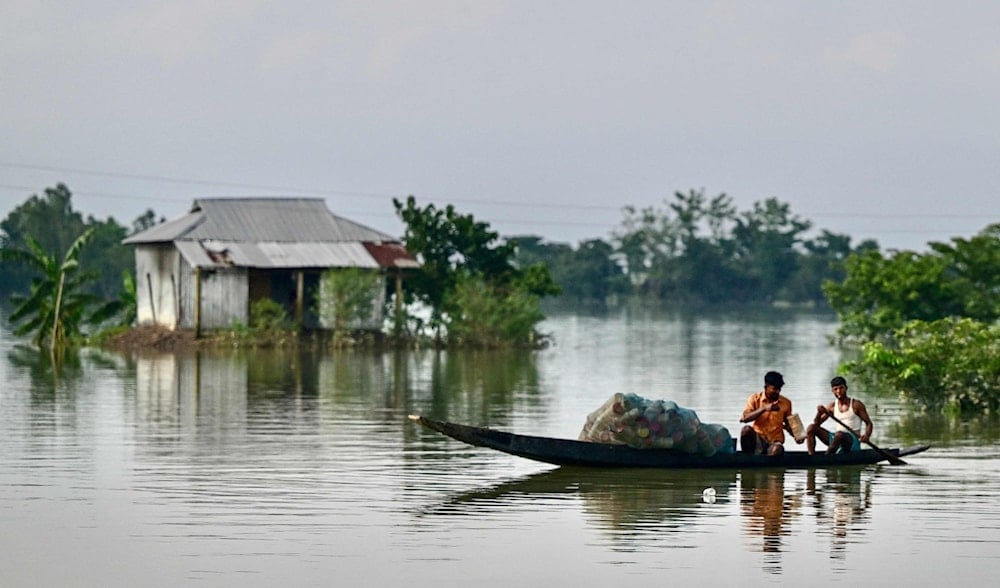Bangladesh floods kill 2 people, leaves hundreds of thousands stranded
Bangladesh blames India for the flood, accusing it of deliberately releasing water from an upstream dam.
-

Fishermen at work in a flood-affected area of Sylhet, northeastern Bangladesh, June 21, 2024. (AFP)
Torrential rains have triggered low-lying floods in Bangladesh, disaster officials said on Thursday, with at least two people killed and hundreds of thousands stranded in at least eight districts in the country's southern and eastern regions.
"Around 2.9 million people have been affected and more than 70,000 people have been taken to shelters," Ministry of Disaster Management and Relief senior official Mohammad Nazmul Abedin told AFP.
The navy and army have been deployed to rescue the stranded individuals using speedboats and helicopters.
Bangladesh is among the most vulnerable countries to both disasters and the impacts of climate change, according to the Global Climate Risk Index, especially due to its hundred rivers and frequent, recurring floods within the last few decades.
The overall region is susceptible to such disastrous incidents where an annual monsoon rain causes widespread damage every year. However, due to climate change, there is an increase in extreme weather events and shifting patterns.
Bangladesh accuses India of 'creating the flood' and its political turmoil
The majority of Banglesh's geography is made up of deltas where the Himalayan rivers, the Ganges and the Brahmaputra, flow towards the sea after passing through India.
The Indian Foreign Ministry rejected accusations made by some in Bangladesh that it was responsible for the floods, denying it had intentionally released water from an upstream dam.
The Ministry attributed this phenomenon to the catchment area experiencing "heaviest rains of this year over the last few days", and that the downstream flow was due to "automatic releases."
Asif Mahmud, the key organizer of the recent student-led anti-quota protests and newly appointed sports minister in the interim cabinet, accused India of not only supporting and sheltering former Prime Minister Sheikh Hasina but of deliberately "creating a flood."
"Floods on the common rivers between India and Bangladesh are a shared problem inflicting sufferings to people on both sides, and requires close mutual cooperation towards resolving them," New Delhi's foreign ministry said in a statement denying Mahmud's accusations.
The floods come after two months of political unrest in the country with violent protests and nationwide police crackdowns imposed by Hasina in response to anti-quota protests.
India supports ‘democratic and stable’ Bangladesh: Modi
In his first high-level talks with Dhaka last Friday, Indian Prime Minister Modi expressed his support for a "democratic, stable" Bangladesh.
Modi made the remarks while receiving a phone call from Muhammad Yunus, the chairman of Bangladesh's interim administration.
It is the first time the two leaders have spoken since Yunus took the oath of office on August 8, three days after the fall of Sheikh Hasina's administration, India's longstanding ally.
Hasina fled to New Delhi following a month of demonstrations against her government.
Modi wrote on X that he “Exchanged views on the prevailing situation” with Yunus and “Reiterated India's support for a democratic, stable, peaceful and progressive Bangladesh. He (Yunus) assured protection, safety and security of Hindus and all minorities in Bangladesh."
Malaysian Prime Minister Anwar Ibrahim also committed Kuala Lumpur's support for the Yunus-led temporary committee, which was enlarged to 21 members Friday.

 3 Min Read
3 Min Read








